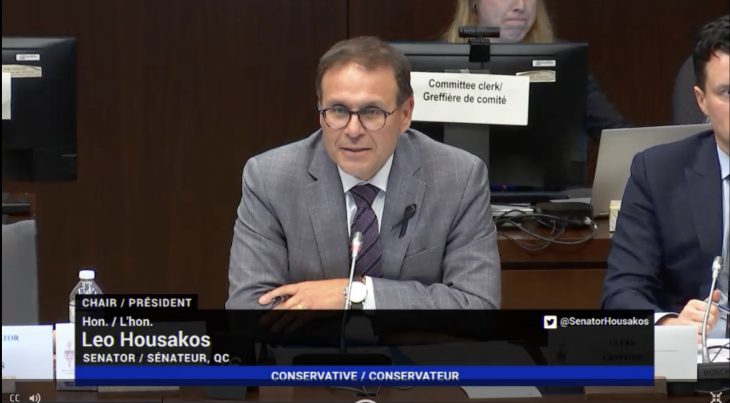
Privacy commissioner says there could be privacy concerns, other witnesses claim CRTC does not have capacity to implement bill
By Amanda Oye
OTTAWA – Bill C-11, which aims to update Canada’s broadcasting legislation, is consistent with Canada’s international trade obligations, Darren Smith, Global Affairs Canada executive director, technical barriers and regulations, told the senate’s transport and communications committee during the first of two meetings held today as part of its study on the subject matter of the bill.
This includes its commitments under the Canada-United States-Mexico Agreement, Smith added.
Back in July, United States Trade Representative Katherine Tai met with Mary Ng, Canada’s minister of International Trade, Export Promotion, Small Business and Economic Development, and expressed concern about C-11.
Smith, who was asked about the meeting and the possibility of the U.S. taking retaliatory measures, said discussions between Canadian and U.S. officials have been “amicable”.
“I think it’s fair to say that the Americans want to make a signal that they’re paying attention to this legislative initiative,” he said, explaining “I don’t think the U.S. has presented any specific threat to Canada in this regard and the reports that I’ve receive from those conversations was that they think the U.S. did appreciate the feedback our minister provided with respect to our ability to continue to ensure that our international trade obligations are indeed respected.”
Smith also told the committee he would not want to prejudge whether C-11 will lead to retaliation from the U.S., but did indicate “the type of retaliation that’s been discussed in this overall review is something that we don’t feel will necessarily come to fruition.” Even still, he pointed out there are mitigation elements in play.
The first meeting of senate committee today also gave members the chance to ask questions of the Privacy Commissioner of Canada, Philippe Dufresne, who emphasized that how the bill is implemented by the CRTC is going to be important in terms of privacy and indicated he and his office have advocated for the opportunity to comment on privacy issues as the bill is implemented so they can share their expertise and make recommendations.
They have further recommended that the notion of privacy protection be added as a purpose of the broadcasting policy, suggesting the language could be adopted from the Telecommunications Act.
Asked by the committee chair, Leo Housakos (above), about any privacy implications related to the fact the committee was told by the CRTC that C-11 opens the door for indirect regulation of user-generated content, Dufresne turned the conversation towards algorithms.
Noting the bill will give the CRTC powers related to discoverability and how algorithms promote certain content, Dufresne said the “algorithms could use personal information,” emphasizing that how the CRTC exercises the powers will be important for privacy and as such, privacy considerations will need to be taken into account before related orders are made.
Dufresne also told the committee C-11 says the Commission cannot require a specific algorithm be used and specifies that the information about audience members that the Commission can ask for cannot be information that could lead to the identification of individual audience members.
He again emphasized the implementation of the principles of the bill is going to be important so when specific tools are used, there are requirements around deidentifying and anonymizing data and so that conditions that are adopted are done so in “a privacy-protective manner”.
While Dufresne argued it is going to be important to look at how the discoverability provisions in relation to algorithms are implemented by the CRTC, Matthew Hatfield, OpenMedia campaigns director, who presented during the second meeting of the day, argued the powers around algorithms C-11 gives the CRTC are too broad and should not be included in the bill at all.
“What we want to see is the CRTC not having a comprehensive power across every single thing users do online and that means taking the algorithm power out,” he said. “Algorithms create almost everything we do online currently. It’s too broad a power to give to the CRTC, especially on such broad terms.”
Hatfield further argued “There’s a huge gap between the damage the CRTC could do here and the good they could accomplish.”
Tim Denton, chairperson of the Internet Society Canada chapter and former national commissioner at the CRTC, was asked whether the CRTC is even capable of implementing the proposed legislation.
Denton’s initial response was to laugh at the suggestion.
“The CRTC is composed of ordinary, reasonable human beings trying to do a good job in light of a statute which is enormous and which carries with it highly intrusive powers, and they are being sent to regulate the terms and conditions under which people shall communicate across the Internet for most of the purposes for which we use the Internet,” he said.
“It is not humanly possible, even if the CRTC were composed of double doctorates in communication law and philosophy, for them to do the job that is being called upon for them to do.”
Pointing out he’s been there, Denton added, “We’re just human, and there’s plenty of times we made significant mistakes, and you don’t want to be making significant mistakes when it comes to the range of human speech and freedom of speech across any communication medium.”
OpenMedia’s Hatfield agreed, telling the committee: “We work with the CRTC a great deal on telecom issues, there’s many good people there, but they have really floundered in recent years even to do the basics in a timely manner of their current duties so the idea that they’re going to take upon magnitudes more complexity and scope and really knock it out of the park is really unlikely in our view.”
The transport and communications committee will continue its study of C-11 tomorrow, with meetings scheduled to take place starting at 10 a.m. ET and 1:30 p.m. ET.



